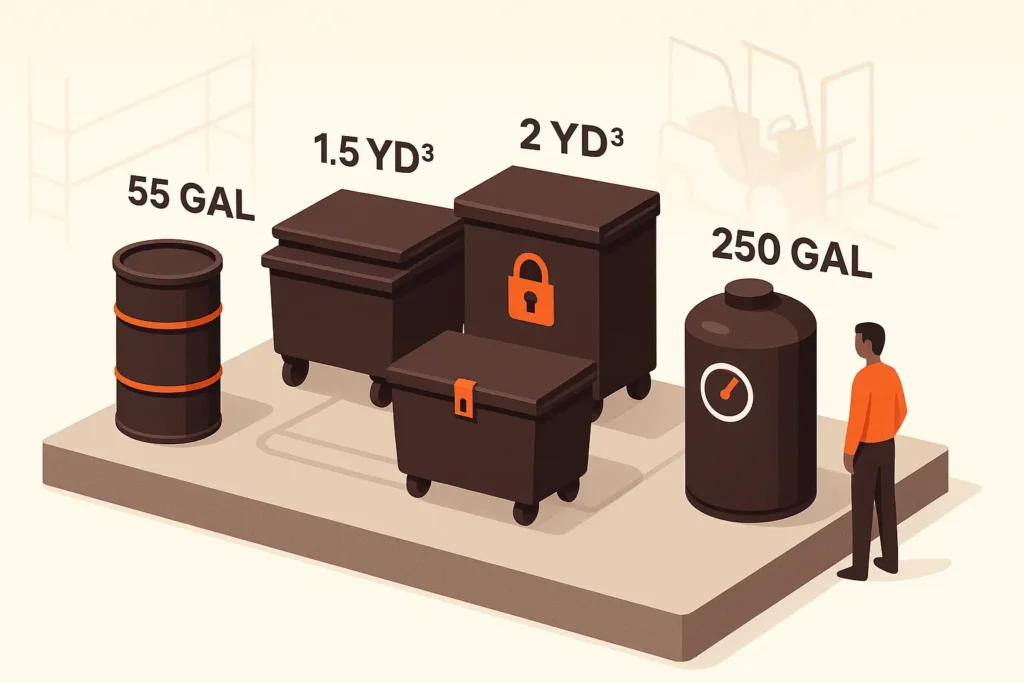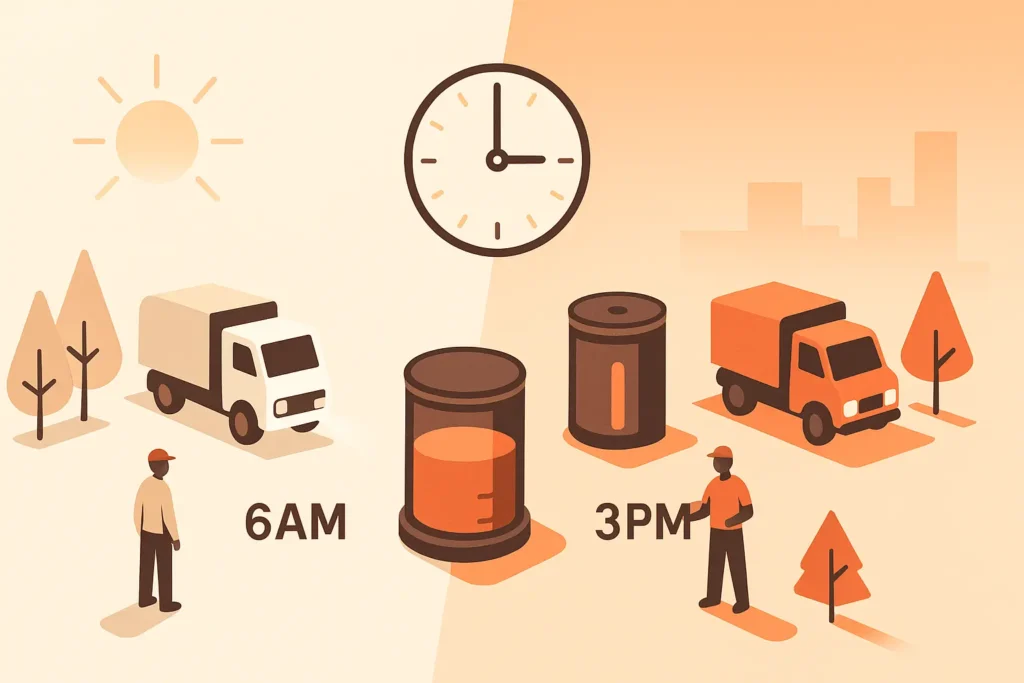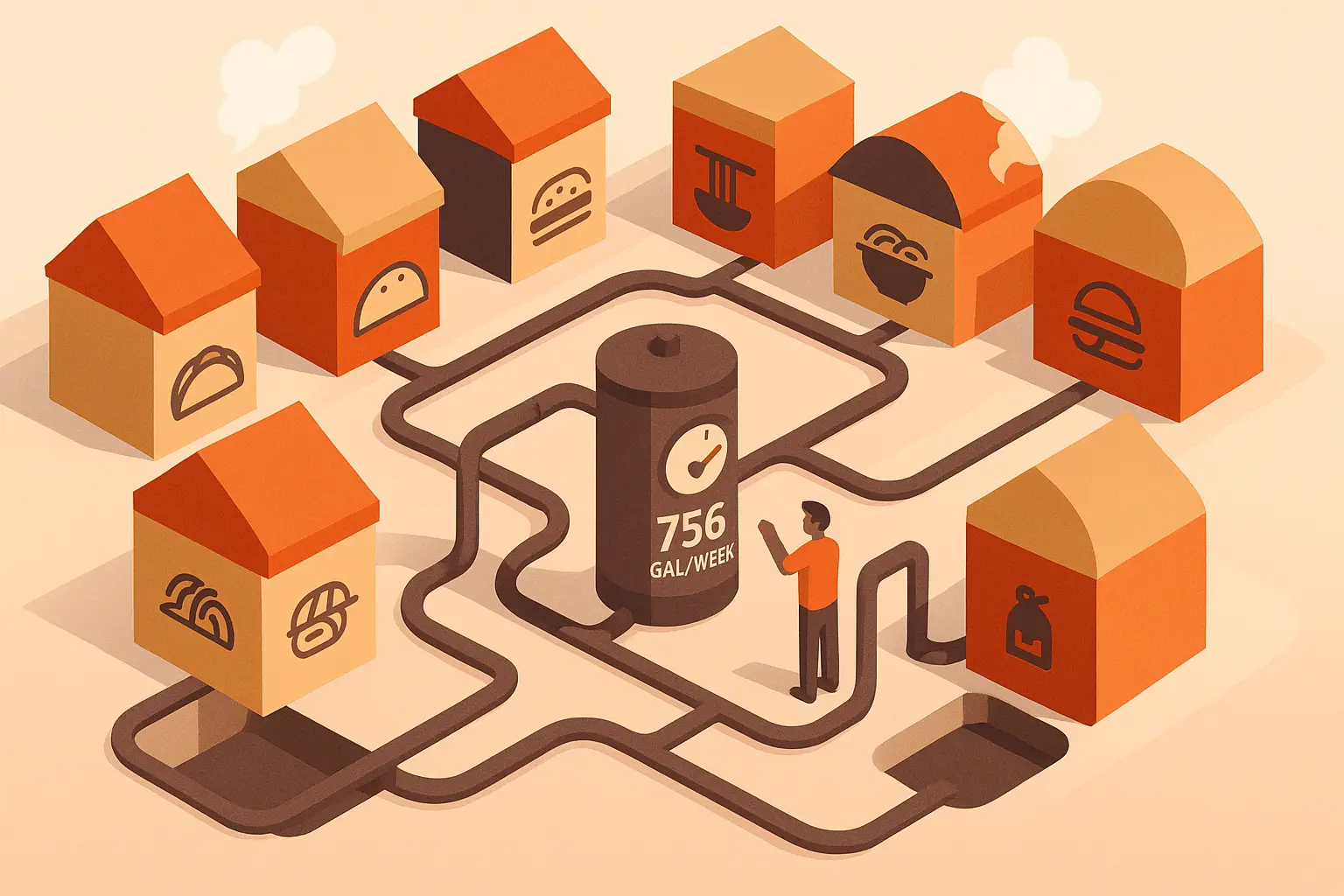Table of Contents
Key Takeaway
A 12 stall food hall that fries nonstop can generate 700 plus gallons of used oil each week. Matching that flow to lockable 140 to 300 gal tanks and two to three sensor triggered pickups keeps kitchens calm, inspectors happy, and revenue flowing from Grease Connections rebates.
Start With the Wattage: How Much Oil Will 12 Vendors Produce?
A single countertop fryer holds about 35 lb (4.5 gal) of oil. Two fryers running three shifts use roughly 9 gal daily. Multiply by 12 vendors and a seven day schedule and you’re staring at 756 gal a week, enough to fill a 140 gal bin five times over.
Pick Containers Your Line Cooks Will Actually Use
A solution that fits everyone beats a dozen barrels blocking the dock. Food halls with shared loading bays lean on low profile indoor tanks (140 gal) paired with a 300 gal outdoor day tank. Lockable lids deter grease theft, a $75 million annual problem nationwide.
| Storage Size | Weekly Volume Fit | Footprint | Typical Pickup | Best For |
|---|---|---|---|---|
| 55 gal drum | ≤120 gal | 9 sq ft | Weekly | Pop up stalls |
| 70 to 95 gal cart | 120 to 280 gal | 26 in × 30 in | Weekly to biweekly | Small restaurants |
| 140 gal bin | 280 to 560 gal | 29 in deep | Twice weekly | Food hall indoor dock |
| 300 gal tank | 560 to 900 gal | Outdoor pad | 2 to 3× weekly | Shared day tank |
Sync Pickups With Foot Traffic, Not the Calendar
Grease Connections recommends “bi weekly to monthly” for ordinary eateries, but a high volume hall needs pickups every Monday, Wednesday, and Friday, or whenever smart sensors hit 80 % fill. Morning windows before 8 a.m. dodge produce deliveries and customer lines, while an optional 3 p.m. sweep resets the floor for dinner rush. Grease Connections vacuum trucks empty a 300 gal tank in under ten minutes, so the fry lines never shut down.

Keep Regulators Smiling (Florida, Georgia, New Jersey)
Florida’s 2022 statute 403.0741 requires electronic manifests for every load and bans dumping at unpermitted sites. Georgia Rule 391 3 6 .24 demands state wide transporter permits for any used oil run. New Jersey treats fryer oil as a “Class D recyclable,” so your chosen collection company must carry an A 901 solid waste transporter license or you shoulder the citation. Grease Connections supplies those manifests automatically, turning paperwork into a download link rather than a panic.
Safety & Quality: Why Filters Still Matter
Filtering oil twice daily extends fry life and cuts change outs, shrinking storage needs by up to 30 %. Staff dump cooled oil through the filter directly into sealed couplers; no open barrels means fewer slips and zero rats. The result: cleaner floors, longer oil life, and better tasting churros.
Dollars and Sense: Turning Grease Into a Revenue Line
With today’s biodiesel demand, used oil pays 30 to 35 ¢ per gallon in Florida and Georgia and slightly higher in New Jersey’s renewable diesel corridor. At 756 gal per week, that’s roughly $11,000 in annual rebates, enough to buy new fry baskets or upgrade hood filters. Regular pickup also dodges $2,500 plumbing fines tied to sewer blockages.
Local Fine Tuning: Adapting to Humidity, Heat, and Snow
- Florida hubs fight 90 °F dock temps; outdoor tanks need sun reflective coatings and spill mats to stop grease blooms.
- Georgia halls juggle freight congestion on Fulton Industrial Blvd; early bird pickups at 5:30 a.m. clear lanes before produce trucks arrive.
- New Jersey winters demand heated couplers to keep oil pumpable below 40 °F and snow safe access around the 300 gal tank.
Grease Connections Advises: One Call, One Tank, Zero Headaches
Grease Connections installs the right mix of 140 and 300 gal tanks in two business days, bundles grease trap cleaning, and pays next day rebates via ACH. A single service agreement covers Florida, Georgia, and New Jersey, so expansion is just a signature away. Read more on our services for custom route maps.










